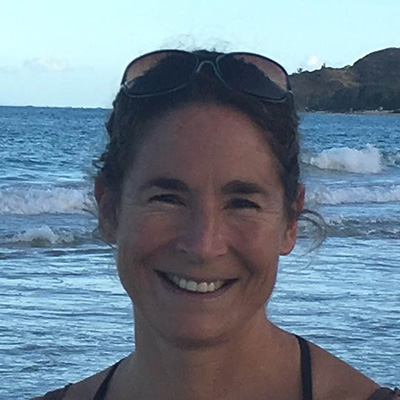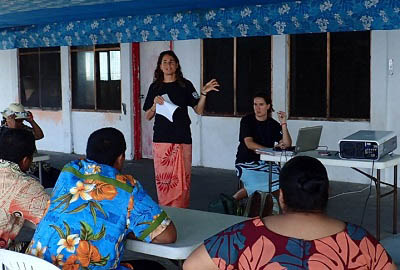Dr. Arielle Levine

Dr. Levine has been working in the SDSU Geography Department for over 7 years and has taught Geo 170: Sustainable Places and Practices, Geo 570: Environmental Conservation Practice, as well as an honors seminar, a special topics course in ocean and coastal sustainability, and various graduate courses. Aside from teaching, she is leading numerous research projects focusing on the interaction between humans and the environment, particularly in ocean and coastal ecosystems.
What got you into your career/research path?
"While studying as an undergraduate at Princeton University, I had the opportunity to go with a PhD student and be a research assistant for a project in a rainforest in Bolivia, looking at about deforestation and its effect on mahogany. I found there was a complex relationship between the indigenous people who were living there and environmental destruction, and I started getting more interested in how people are directly and indirectly affected by environmental destruction and conservation, as well as how could we better involve local communities to improve natural resource management. Later, through a fellowship, I realized that I was more personally excited about ocean and coastal ecosystems than forests, which is why most of my research now tends to be around coastal systems."
What are some research projects you are currently working on?
"We have a collaborative NSF-funded project now with researchers at the Scripps Institute of Oceanography looking at climate effects on fisheries in the California current.
Another project is in American Samoa, which is looking at social-ecological vulnerabilities of coral reef fisheries to climate change, exploring both the ecological and social implications for local fisheries. I also have a related project there that looks at people’s use of local resources and priorities for marine resource management around marine protected areas.
I have another project in Hawaii looking at sunscreen use. The state of Hawaii recently implemented a ban on the sale of sunscreens containing certain chemicals (oxybenzone and octinoxate). These are considered two of the most harmful to coral reefs and are common in sunscreen. The ban does not go into effect until 2021. We are trying to get an idea of hopefully pre and post effectiveness of the ban, looking at how aware people are of the issue, what kind of sunscreen people are using, why they chose the sunscreen they do, and whether they are purchasing sunscreen in Hawaii or elsewhere. We conducting the study on the Big Island, Oahu, and potentially Maui."

What did you learn about the environment throughout your research?
"There are no simple answers to our conservation problems, but there are directions that you can go that are more effective than others. I think keeping an open perspective and not shying away from complex questions to try to create the most effective policies (socially and ecologically) is an important thing to do. I am always learning, I learn new (and sometimes surprising) things everyday."
What kind of people do you look for to help you with your research?
"The main thing is finding a student who is very interested and excited about the research questions, as well as reliable. I have taken students who have done a broad variety of projects; I don’t necessarily require that students do my exact research projects. It’s exciting when students come in with their own research ideas, and I’m happy to be involved as long as it is something I can be helpful with. For my own projects, I usually want somebody who is interested in what I am doing and has the ability to fit in some way for what we need for the project."
Any tips for students?
"It’s important to look at what opportunities are out there and try to get experience to see what you are really passionate about. A lot of people feel passionate about sustainability broadly, but for a career you usually you have to pursue some aspect of it in a more concrete way. You have to see what you are good at, and also what you are most excited about and go in that direction. This means trying a bunch of different things (getting internships, talking to lots of different people, or taking different classes). Test out different areas of sustainability that you think are the most interesting, important, or exciting and go that direction."
Have anything to add?
"Something that has impressed me about SDSU and something that is important to think about is that a lot of the sustainability initiatives on campus have happened because of students. Students should not underestimate the influence they have, and they should continue to push our campus to be more sustainable and keep us going that direction."
Thanks for teaching and researching ways to make our world more environmentally conscious!
